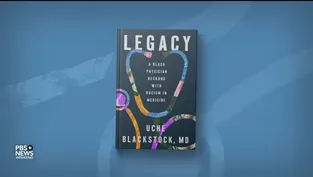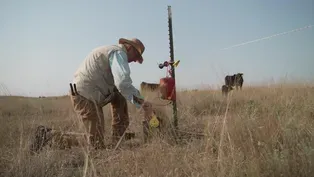
LGBTQ Ugandans fight to survive under country’s anti-gay law
Clip: 1/28/2024 | 8m 36sVideo has Closed Captions
LGBTQ+ Ugandans fight for survival, civil rights under country’s anti-gay law
Uganda’s constitutional court is expected to rule soon on a law that threatens fines, life imprisonment and even death for being gay. Ugandan civil rights groups challenged the Anti-Homosexuality Act in December amid international pressure to repeal the law. Ali Rogin speaks with two Ugandan LGBTQ+ activists for more.
Problems with Closed Captions? Closed Captioning Feedback
Problems with Closed Captions? Closed Captioning Feedback
Major corporate funding for the PBS News Hour is provided by BDO, BNSF, Consumer Cellular, American Cruise Lines, and Raymond James. Funding for the PBS NewsHour Weekend is provided by...

LGBTQ Ugandans fight to survive under country’s anti-gay law
Clip: 1/28/2024 | 8m 36sVideo has Closed Captions
Uganda’s constitutional court is expected to rule soon on a law that threatens fines, life imprisonment and even death for being gay. Ugandan civil rights groups challenged the Anti-Homosexuality Act in December amid international pressure to repeal the law. Ali Rogin speaks with two Ugandan LGBTQ+ activists for more.
Problems with Closed Captions? Closed Captioning Feedback
How to Watch PBS News Hour
PBS News Hour is available to stream on pbs.org and the free PBS App, available on iPhone, Apple TV, Android TV, Android smartphones, Amazon Fire TV, Amazon Fire Tablet, Roku, Samsung Smart TV, and Vizio.
Providing Support for PBS.org
Learn Moreabout PBS online sponsorshipon a law that threatens fines life imprisonment,# even death just for being gay.
Ug rights groups challenge the anti-homosexuality# act in December, and the United States has joined## a growing international outcry by sanctioning# Uganda by restricting visas and withholding trade.
Ali Rogin spoke with two# Ugandan LGBTQ plus activists,## including one who just survived an# attempt on his life.
And we should## warn you that some of the images in this# report may be disturbing for some viewers STEVEN KABUYE, Colored Voice Truth to LGBTQ: The# man that tried to cut my neck shouted what's in## the local language of Uganda, ffa musiyazzi,# which is translated to die you homosexual.
ALI ROGIN (voice-over): Steven Kabuye is# the executive director of the advocacy group## Colored Voice Truth to LGBTQ, he's faced death# threats since March because of hi Then last month, he filmed himself on the# ground clinging to life after being stabbed## repeatedly by unknown assailants outside# his home.
He's now receiving care outside## Uganda.
But Kabuye says the police seemed more# focused on his being gay than on the attack.
STEVEN KABUYE: People wanted end my life# and the police was really looking into my## sexuality and everything.
And two days later# when they came to get they kept on asking me how I became gay.
ALI ROGIN (voice-over): Activist say that this is# the new normal f the Anti-Homosexuality Act became law last May.# It calls for life imprisonment for having gay sex,## and imposes up to 20 years in prison for anyone# promoting homosexuality.
And it calls for the## death penalty for having same sex relations with# minors, disabled persons or people with HIV.
A majority of Ugandan support the# controversial law, and most of its## main enforcers have been everyday citizens.# A coalition of rights groups documented 281## instances of vigilante abuses against LGBTQ# plus people last year, versus 25 times when## the government was behind the abuse.
Some suffer# in silence and can't rely on friends or family.
MAN: As a person I felt suicidal because# of my family was like, if they give you,## they told me themselves, even if they give you the## death sentence for us we shall see it# as justice b ALI ROGIN (voice-over): The laws fate is# ultimately up to Uganda's Constitutional Court,## but the United States and others have# stepped up pressure to repeal the law## and protect the country's LGBTQ plus community.
Last August, the World Bank halted# new loans to Uganda.
And in th e U.S. imposed visa restrictions# on hundreds of Ugandan officials## and their families.
Ugandan President# Yoweri Museveni dismissed the actions.
YOWERI MUSEVENI, Ugandan President: They tried to# put pressure on us.
Pressure if you don't do this,## we shall not -- we shall not allow you to go# to America.
I don't want to go to Ame ALI ROGIN (voice-over): This isn't# the first time Uganda has grappled## with a law like this.
In 2014, a similar# bu the court overturned it on procedural grounds# following Western sanctions and suspension of aid.
ALI ROGIN: For more we turn to Clare# Byarugaba, an LGBTQ plus activist.
She's## the equality and non-discriminat on coordinator# for Chapter Four Uganda, a civil rights group.
Clare, thank you so much for joining us.# How has this law affected you personally,## if you wouldn't mind sharing?
And also# how has it affected your community?
CLARE BYARUGABA, Chapter Four Uganda: Thank you# so much, Ali, for having me.
As an LGBT co we are really facing one of the worst experiences# that anyone can go thr are a form of state sponsored homophobia and# transphobia.
The very purpose of this law is## to basically erase the LGBT community from the# face of the earth.
But we have fighting back.
ALI ROGIN: We understand that the# Constitutional Court is set to rule## any day on the constitutionality of# this law.
What are your ho the outcome of that ruling?
And how would# it affect the implementation of the law?
CLARE BYARUGABA: We're asking the courts to# look at the substantive arguments that we## are putting in our petitions to declare that# this law is unconstitutional o grounds to protect and enshrine the rights# of LGBT individuals.
Because this means## that once the courts if they're independent# enough, declare this law unconstitutional,## it would mean that the risk of# having another anti-gay law very low.
And of course the world is watching and# especially African countries that are## thinking of proposing or passing similar laws.# They rushing to see what happens in Uganda.
ALI ROGIN: Since this laws implementation, how has# it affected the ability for LGBTQ plus communities## to access health care, particularly in the# context of Uganda spite to eradicate aids?
CLARE BYARUGABA: So this law has been,# has rolled back the current trend that## Uganda was on to reach the zero infections# by 2030.
We see that the LGBT community,## particularly men who have sex with men,# gay men, and transgender individuals,## failing to go to hospitals for care, because# the law requires doctors to report suspected## LGBT individuals or those that are suspected to be# involved in same sex, sexual activity, consensual## or otherwise.
So this has rolled back really# the progress that Uganda had made in the past.
ALI ROGIN: How popular is this# law with Ugandan citizens overall?
CLARE BYARUGABA: We see a resurgence of# particularly us, evangelical extremists## coming to Uganda, coming to other African# countries, saying this is something that## you have to focus on.
So we're seeing it's# kind of a form of recolonization, where U.S.## evangelical extremists have lost ground in their# own countries, and they see Africa as ground zero.
We often say that, you know, homophobia# is not a homegrown fight.
You know,## Africans don't hate each other.# Someone has radicalized them,## someone has to tell them lies false allegations# that LGBT individuals are recruiting their## children, or that we have this this plan to# eradicate that traditional family in Uganda.
So this dangerous rhetoric has, unfortunately,# is unfortunately being believed by the ordinary## citizen of Uganda.
And in turn, they# are -- they have become vigilantes.
ALI ROGIN: What do you make of the response that# the international community has had to this law,## particularly from countries where protections# for LGBTQ plus communities do exist?
CLARE BYARUGABA: We have called for# international solidarity.
We've called## for international pressure and it's working,## because without international pressure, I# would probably be in ALI ROGIN: Has the United States# in particular done enough?
CLARE BYARUGABA: The United# States has done quite a lot.## And I will applaud the U.S. government# for responding to our ca for financial and visa restrictions.
But# the U.S. government can do so much more.## The U.S. government is seen as a leader in# protection of international human rights.
So it's important that the government# continues to do more in terms of applying## pressure and increasing the sanctions# base against proven individuals that## are blatantly promoting the violations of# LGBT individuals and opposition leaders.
We know that any country, any country's democracy# is measured in how it treats minorities,## and in this case they they've gotten government# is failing us.
It's failing to protect us.
It## is putting us at risk every day.
And this# is unacceptable in any democratic country.
ALI ROGIN: Clare Byarugaba, an activist# with the civil rights organization,## Chapter Four Uganda, thank# you so much for your time.
CLARE BYARUGABA: Thank you, Ali.
A Black physician’s memoir details medical racism in America
Video has Closed Captions
Clip: 1/28/2024 | 5m 58s | A Black physician’s memoir looks at the legacy of medical racism in America (5m 58s)
Montanans band together to save an iconic American landscape
Video has Closed Captions
Clip: 1/28/2024 | 5m 9s | How Montanans are banding together to preserve an iconic American landscape (5m 9s)
Providing Support for PBS.org
Learn Moreabout PBS online sponsorshipSupport for PBS provided by:
Major corporate funding for the PBS News Hour is provided by BDO, BNSF, Consumer Cellular, American Cruise Lines, and Raymond James. Funding for the PBS NewsHour Weekend is provided by...













